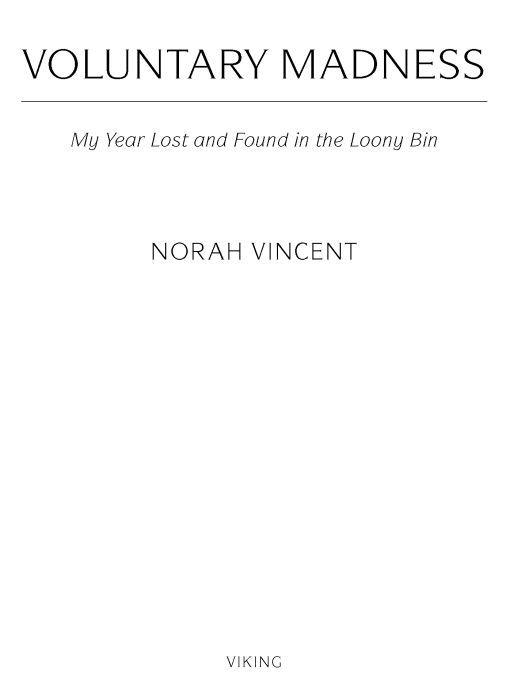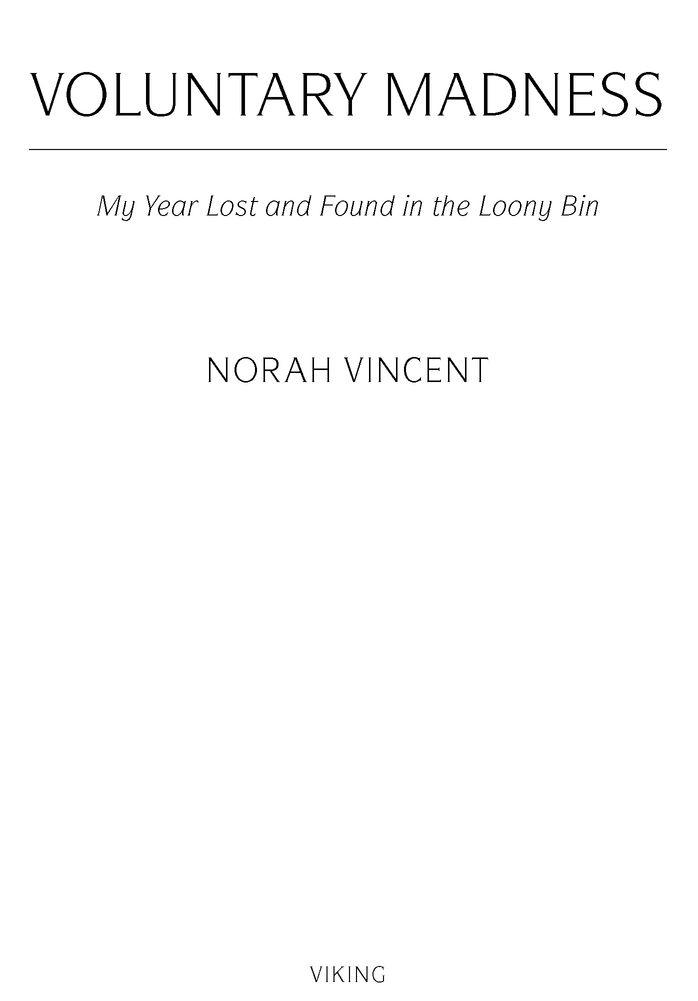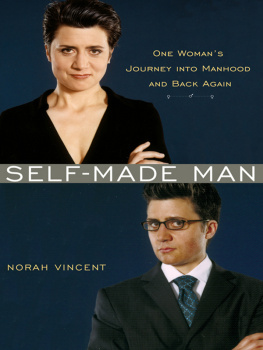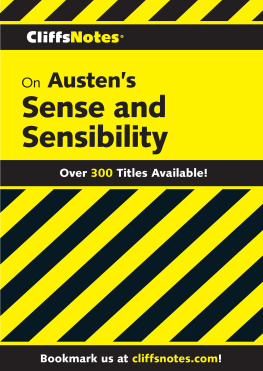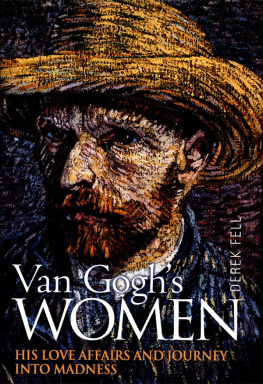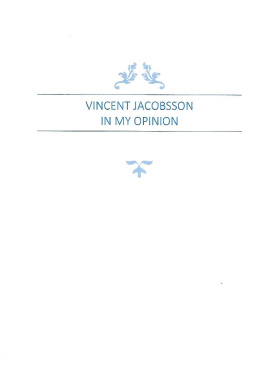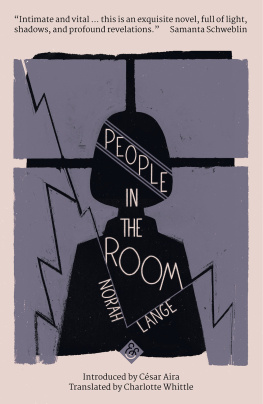Table of Contents
ALSO BY NORAH VINCENT
Self-Made Man
TO TEDDY
CURRICULUM
In November 2004, just as I was finishing the research for my book Self-Made Man, I checked myself into a locked psychiatric ward in the hospital.
I never finished that research. Instead it was cut short by a depressive breakdown that scared me enough to convince me that it would be better both for me and for those around me if I didnt go on walking the streets looking for someone to hurt me.
It may sound unduly dramatic to suggest that writing a book would drive a person into the bin (though Im sure there are at least a few hundred thousand Ph.D. candidates and other wee-hour scribblers out there who would beg to differ on this score), but in my case, it was quite literally true. I lost it, in medias research, so to speak, and for good reason.
The research for Self-Made Man had been unorthodox, to say the least, since it had entailed disguising myself and then living, dating, working, and recreating as a man. I became a man, at least as far as the people around me knew, but I remained a woman, and that psycho-emotional contradiction in terms pulled me apart at the seams slowly and insidiously for eighteen months, leaving me limp and in tatters, sitting semicatatonic in my pajamas outside a nurses station in the hospital, torporously signing away my freedom and giving my consent to be forcibly restrained if necessary.
Real lives and lived experience are the laboratory of the immersion journalist, and the journalist herself is the guinea pig. Consequently, a lot can change between the proposal and the finished book, and always does.
That is the whole purpose, after all. If you knew what was going to happen in the end, there would be no point in starting. Setting out to prove a point only colors the experience and then skews the results more than your inescapable subjectivity and prejudices already do. You have to leap. You have to be a bit reckless. Maybe more than a bit. Maybe a lot.
This is at once the adventure and the peril of what I do, and, for better or worse, it means I follow where the rabbit hole leads.
Last time around it landed me in the bin. But once I got there, I realized that bins are pretty fertile ground for writers of my stripe, and not altogether uninteresting places to be locked away for a few days with a notebook and a crayon (or whatever other nubby stylus theyll let you get your certifiable fist around).
As I sat there in the ward that November, wondering how the hell I was going to talk my way out of that zombie parlor, I said to myself, Jesus, what a freak show. All I have to do is sit here and take notes, and Im Balzac.
And that was it. Bam. That was how the idea for this book came to me, and I to it. Of course, idea is the operative word here, since the book I set out to write and the book you are holding in your hands are two quite different things. But then, as Ive said, being an immersion journalist, I expected that.
I started in that ward with the theatricality of it all, distanced from my own condition, contemptuous, trapped, yet interested. But interested the way a field entomologist is interested, stooping to see, a deigning species apart, marveling at the hive or the colony and poking it with her pencil to get a better view.
Somerset Maugham once wrote that quotation is a passable substitute for wit, and so for me, prurience was a passable substitute for something better. Imagination? Diligence? Insight? I dont know. I thought I was in a foreign country, and so, like every frisky tourist, whose intrusiveness is pure entitlement, I was curious about the customsand possessive, too. I wanted these people to myself, to make them mine in word and sentence.
These were living dolls, characters ready-made for me, shuffling by in all their goggle-eyed magnitude and efflorescent distress. I liked them that way, and I watched.
I did not accept, then, that I was one of them, and that the foreign country, the theater, the rabbit hole, was not out there but in my head.
I spent four lost, interminable days in lockup that first time in the bin, getting worse, weeping at the sealed windows, yelping for rescue through the pay phone in the soul-destroying dayroom, wrapping into my roommates seamless paranoia, and, finally, out of sheer rage, altogether losing what was left of my tenuous grip.
Then, scared Soviet of being stuck in there for months, I resolved to slip the trap and ingratiate myself to the pen pushers and paper pilers of the system. I put up a front of cool argument and reasoned my way out.
I got home a wreck, and swore that, no matter how bad I felt, I would never willingly go into such a place again. Never.
And yet, there was the lure, the powerful lure of the spectacle, and the human drama, and what I saw as the outright wrongs of the insanitarium, wrongs that I so longed to expose and ridicule, and hold up to public scrutiny. I felt centripetally attracted to the subject matter, to what I couldnt help seeing as the thematic cornucopia of the bin.
I wanted to immerse myself in that. Be the patient once more. It wasnt a stretch, obviously, but it was daunting nonetheless. I knew that in order to write a book about madhouses, Id have to spend much more time locked away, and in several different types of institutions.
Wouldnt that drive me mad again, madder than being a man had ever done? Or would it only reveal a madness already there, entwined. Was I the reason to do it? Mad me turning to face me in the mirror of other warped faces?
After all, there was far more to my backstory, more to my personal investment in the topic, than that first trip to the bin.
It began more than ten years ago when I first went to a psychiatrist complaining of persistently gloomy and vaguely suicidal thoughts. I was in my late twenties, still working as a glorified secretary in a job that I was overqualified for and understimulated by. I had gotten to that age when all well-loved children of the upper middle class begin to discover that the world is not made for them, that all meaningful questions are rhetorical, and that the term soul mate is, at best, a figure of speech.
I had had too many ill-conceived relationships defiantly not rise phoenixlike from the flames. I couldnt see spending the rest of my working life wearing pantsuits, but I didnt know how to convert my expensive education into the bohemian Kulturkampf I was dreaming about. I did not relish what I saw as my prospects for love or money. I was sorely disappointed by my oyster, and so I despaired, flagrantly, aromatically, in purple poetry and reefer.
What can I tell you? It was the 1990s. The patant was the bourgeois, and Kurt Cobain was dead. Despair was an icon, and I was in my Saturn return. I was stuck at an age when a lot of people are stuck. I was morose at an age when a lot of people are morose. I was spoiled. I thought life was supposed to make you happy, and I wasnt going to drudge for a living.
Did I need medication? Or did I need someone to talk to? Someone, that is, who would do more than charge the going rate for nodding and whip out a prescription pad before the first fifty minutes were up. Was I physiologically depressed? At an innate biochemical disadvantage? Or was reaching for the pad just the way things were done because the doc had been well patronized by the drug reps and had plenty of samples in her file cabinet?

